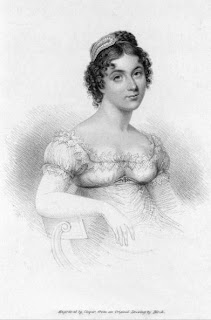 As you know, The Riskies all love a debut author. Today we welcome debut author Stefanie Sloane whose first book, The Devil in Disguise, will be released May 24.
As you know, The Riskies all love a debut author. Today we welcome debut author Stefanie Sloane whose first book, The Devil in Disguise, will be released May 24.
The Devil in Disguise has received some pretty impressive endorsements:
“Captivating… Stefanie Sloane will charm her way into readers’ hearts.” –Susan Wiggs
“Smart, sensuous, and sparkling with wit…. Spectacular.” –Julia Quinn
Stefanie will give away one signed copy of The Devil in Disguise to one lucky commenter chosen at random. Without further ado, let’s welcome Stefanie to Risky Regencies.
Stefanie, tell us about The Devil in Disguise.
And then I had to, you know, actually write the book, which it turns out is way more tricky than anything I’ve ever endured at the gym.
Oh, most definitely! I love the research part of writing—a little too much, actually, as I’ve been known to spend hours pouring over books and websites in search of the perfect touch for a scene. One of the most interesting aspects about the research for my debut was the fact that SO many interesting individuals turned out to be spies during the time period. From poets and professors to important politicians, clergymen, actors, and more were involved in espionage.
Honestly? Actually sitting down and finishing the book was the biggest risk for me. Before The Devil in Disguise, I’d poured my heart and soul into writing a contemporary chick lit manuscript. I signed with a top agent and thought that my career was going to really take off, the future looking as limitless as a summer sky. And then every last publisher passed on the book. I was devastated. It took a long time for me to think about writing again, and when I finally did sit down to start the Young Corinthians series, I was scared. Actually, terrified. Writing is unbelievably hard work on every level, and I just didn’t think that I could put myself through the process once again knowing that there would be no guarantees when I reached “The End.”
 But, the only thing worse than the fear of a second rejection would have been the regret I felt over letting myself get in the way of, well, myself. So I finished the book, and the rest, as they say, is history.
But, the only thing worse than the fear of a second rejection would have been the regret I felt over letting myself get in the way of, well, myself. So I finished the book, and the rest, as they say, is history. And I recently turned in the fourth book, tentatively titled, The Saint Who Stole My Heart, to my editor. Fingers crossed that she loves it!
And I recently turned in the fourth book, tentatively titled, The Saint Who Stole My Heart, to my editor. Fingers crossed that she loves it!




